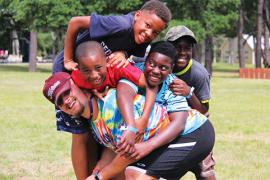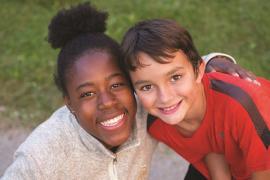My first time working at summer camp, in fact during my first week, I melted off every one of my fingerprints. I was only 16 at the time, and I remember feeling shocked that this could actually happen. I also remember shamelessly considering what shenanigans I could get away with as a super cool, Justin Bieber-haired, imminently clever teenage boy without fingerprints. (The answer: not much.)
I should mention that the melting part was an accident. As one of a crew of junior counselors, I was sometimes responsible for washing dishes. Now, as any kitchen veteran will attest, washing dishes for an entire camp is a character-building experience. Some experiences, though, build more character than others. For example, I now know that if one grabs two ceramic coffee mugs right out of the dishwasher barehanded, one runs the painful and powerful risk of incinerating fingertips — and building quite a bit more character than was bargained for.
Today, after a rich experience in camp life — from 16-year-old trainee to full counselor, from maintenance staff to administration — I can see this early episode schooled me in two absolutely vital aspects of what it means to be a camp counselor. The first is that all kinds of things can burn, even things that are not actively on fire. This includes paint thinner, boiling water, rocks rather near a fire and, of course, poor judgment (all stories for another time).
The second lesson is more philosophical: It’s the role that risk management plays in camp life. For newer staff, it’s savvy to realize that managing the risks of camp — waterfronts, wasps, hot mugs, and life’s number-one danger, slip and falls — is always on your bosses’ minds. That means paying attention to safety details and quickly bringing up any problems you see is a sure-fire way to gain the trust and respect of your supervisors.
But risk management goes much deeper than that. As camp staff, we always strive to build a safe environment for our campers. But that’s not simply because safety is good for our insurance premiums. It’s because effectively managing things like physical risks — “Folks, remember these rocks are slick!” — creates an environment where campers feel safe. Then they feel comfortable to take the kinds of risks that are essential to their growth and happiness. I want to feel like I’m being completely honest when I tell a struggling child, “You can try it! This is a safe place to take risks.”
But it’s not just real dangers that we manage; we also manage our campers’ perceptions of those risks.
A powerful example for me came in one of my campers, let’s call him Antonio, who had never spent much time outside. I had a fantastic co-counselor in my cabin that summer, and I marveled at how patiently he answered Antonio’s sometimes silly questions. “What if we see a bug?” One time I barely stifled a laugh when he asked, “If we see a snake, will it eat us?”
“No, we are much too big for a snake,” my co-counselor would say, or, “If we see a bug, we’ll let it go about its business pollinating flowers.” After a while I caught on and witnessed some classic camp magic: Antonio started to open up. He transformed into a regular jokester, and we all learned how silly and kind he could be. He became so comfortable with us and his friends that he even performed a break-dancing routine by himself in front of the entire camp. As promised beforehand, we were in the front row to cheer him on, and the audience loved his performance. It was such a proud moment for me. I saw firsthand how not only managing risk — but also Antonio’s perception of that risk — had pushed him to discover confidence and joy on his own.
Antonio’s story, and dozens like his, make me wonder about my first summer camp job all those years ago. I think about the “problem campers” I claimed to have. What if I’d thought more proactively about my campers’ needs? I have learned volumes from those early mistakes. I understand now that through my actions, both savvy and reckless, I possessed a different kind of fingerprint all along — the kind that even a volcanically hot coffee mug can’t melt away.
Photo courtesy of Jane Izard, Photographer, Green River Preserve, Cedar Mountain, North Carolina.
Avery McGaha is a graduate student in environmental journalism at the University of Colorado Boulder. He spent the best days of his life at Green River Preserve — washing dishes, hiking with kids in the rain, and teaching them about ants.




